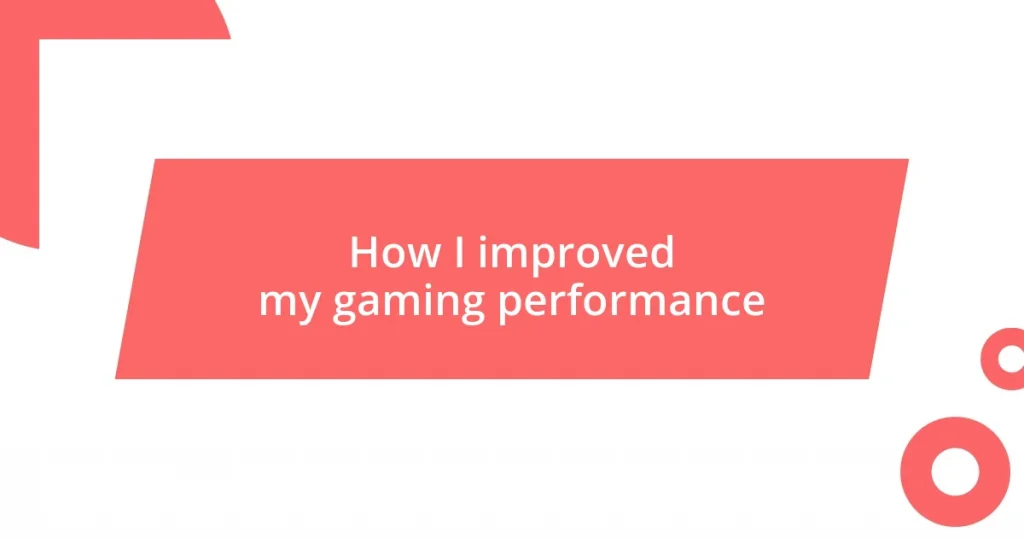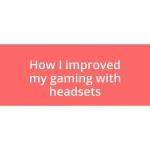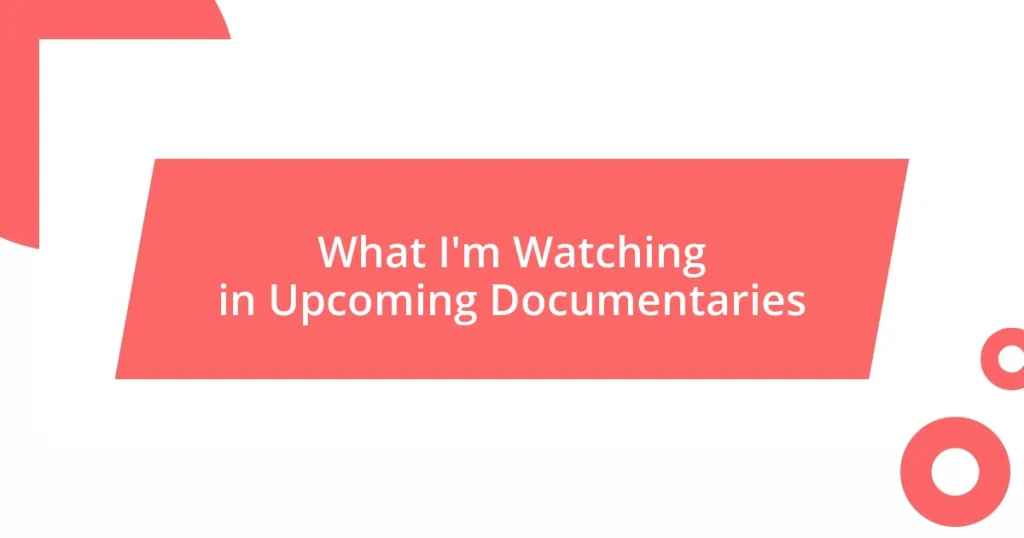Key takeaways:
- Maintaining a balance between mental clarity and physical setup significantly enhances gaming performance, highlighting the importance of focus and stress management.
- Setting clear, specific, and measurable goals guides players in tracking progress and developing skills, transforming casual gaming into a disciplined pursuit.
- Optimizing gaming setups, practicing effectively, and prioritizing physical and mental health contribute to improved gameplay and overall player experience.
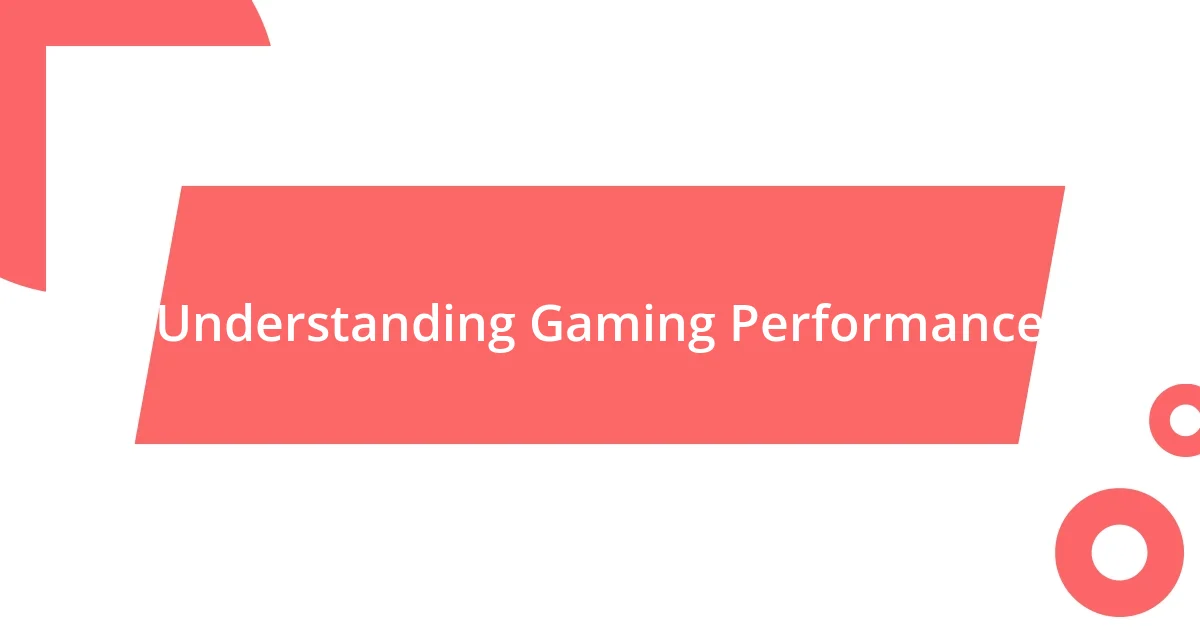
Understanding Gaming Performance
When I think about gaming performance, I can’t help but reflect on those intense nights spent honing my skills. Performance is not just about the hardware; it’s also a mindset. How often do we get caught up in gear upgrades yet forget the importance of mental clarity during gameplay?
I recall a time when I struggled in a particular game because my focus was all over the place. I realized that understanding performance involves recognizing the balance between physical setup—like controller sensitivity—and psychological factors, such as stress levels. Have you ever noticed how a single distraction can throw off your entire game?
Moreover, the notion of performance encompasses various elements, from frame rates to reaction times. Inevitably, I discovered that practicing specific techniques, like muscle memory drills, drastically changed how I viewed my gameplay. Every little improvement creates a ripple effect, reinforcing that understanding gaming performance is an ongoing journey, not merely a destination.
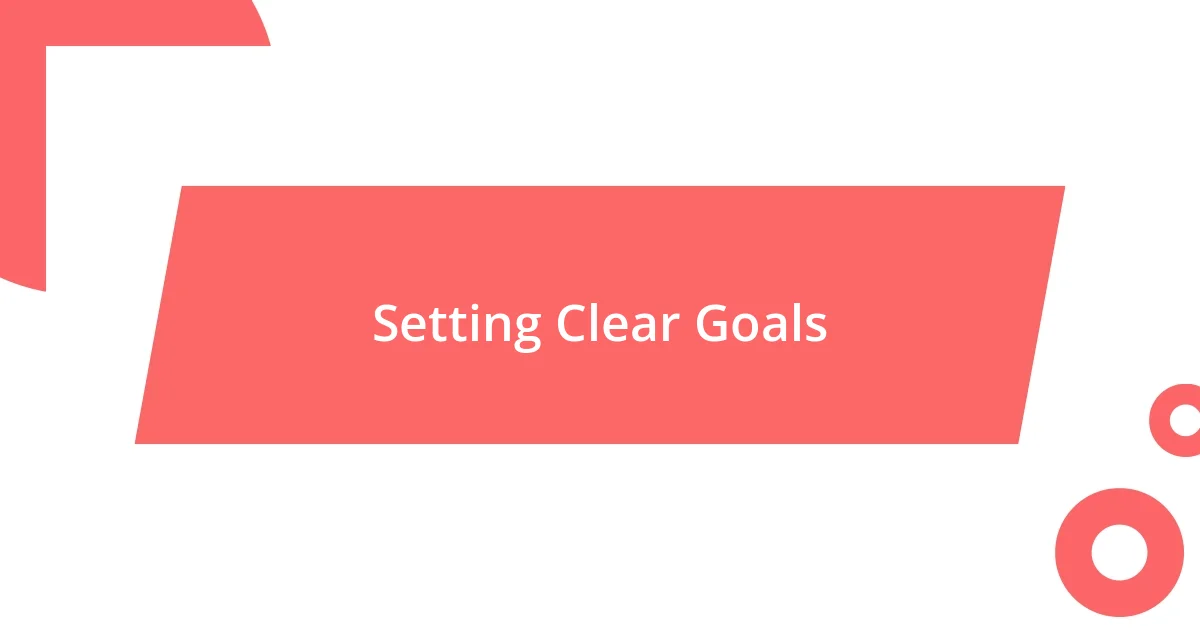
Setting Clear Goals
Setting clear goals is crucial for enhancing gaming performance. I vividly remember when I set a specific target to improve my kill-death ratio in a competitive shooter. Focusing on this one measurable objective provided me with a sense of direction, turning chaotic gaming sessions into structured opportunities for growth. It felt incredibly rewarding to track my progress and witness tangible improvements.
To clarify the process, here are key aspects I considered when setting my goals:
- Specificity: Instead of vaguely saying “I want to get better,” I stated, “I aim to improve my accuracy by 10%.”
- Measurable: I used stats from my gameplay to establish benchmarks, making my goals easily trackable.
- Achievable: I made sure my goals were realistic, considering my current skill level and available practice time.
- Relevant: Each goal was tied to my broader vision of becoming a top player in my favorite game.
- Time-bound: I set a deadline of one month to reach my objective, creating urgency and focus.
By following these principles, I consistently pushed myself, turning gaming from a casual pastime into a disciplined pursuit of excellence.
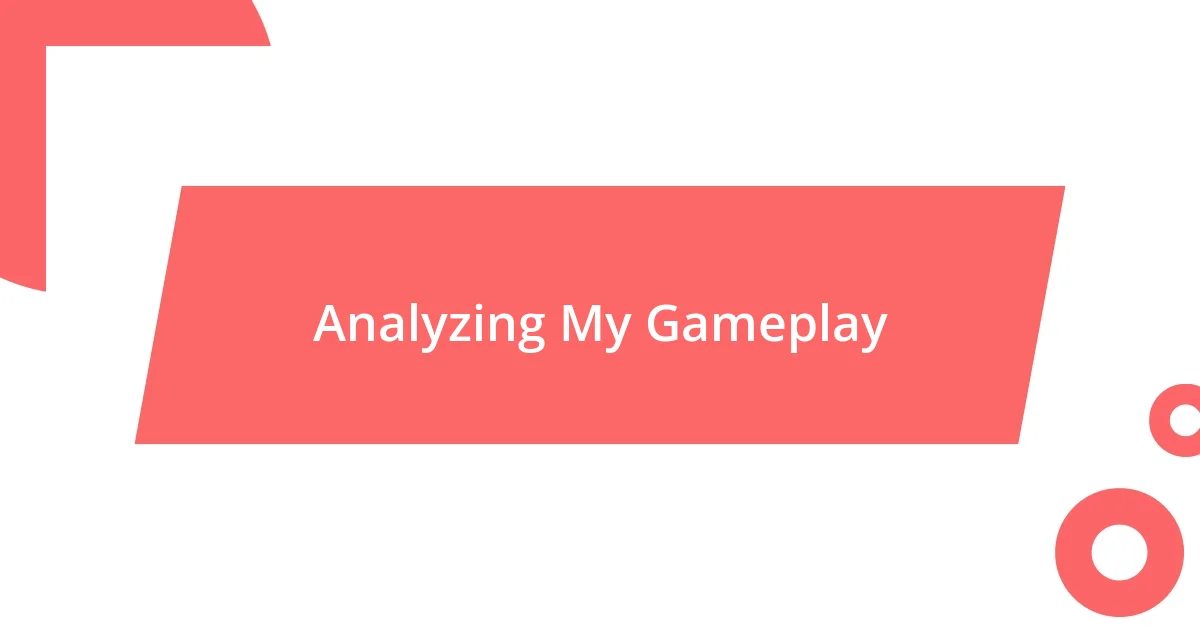
Analyzing My Gameplay
Analyzing my gameplay has been a transformative experience. Instead of just playing through matches, I dedicated time to reviewing my performance. I remember one session where I recorded my gameplay and then analyzed the footage. Watching myself made me realize how often I made hasty decisions. This was a game-changer; it not only highlighted my weaknesses but also reinforced my strengths.
There’s something powerful about breaking down specific moments in a match. I learned to focus on crucial elements like positioning and decision-making. For instance, analyzing a crucial encounter in a multiplayer game made me see that I frequently rushed into fights without proper information. Understanding these patterns can often be uncomfortable, but it’s essential to growth. Each review session was like peeling away layers, leading to deeper insights.
Through this analytical lens, I also started creating a comparison table to visualize my performance metrics. This approach helped me identify trends and adjust my strategies accordingly. Here’s a glimpse of the metrics I focused on:
| Metric | Before Analysis | After Analysis |
|---|---|---|
| Kills | 5 | 12 |
| Deaths | 10 | 5 |
| Accuracy | 45% | 60% |
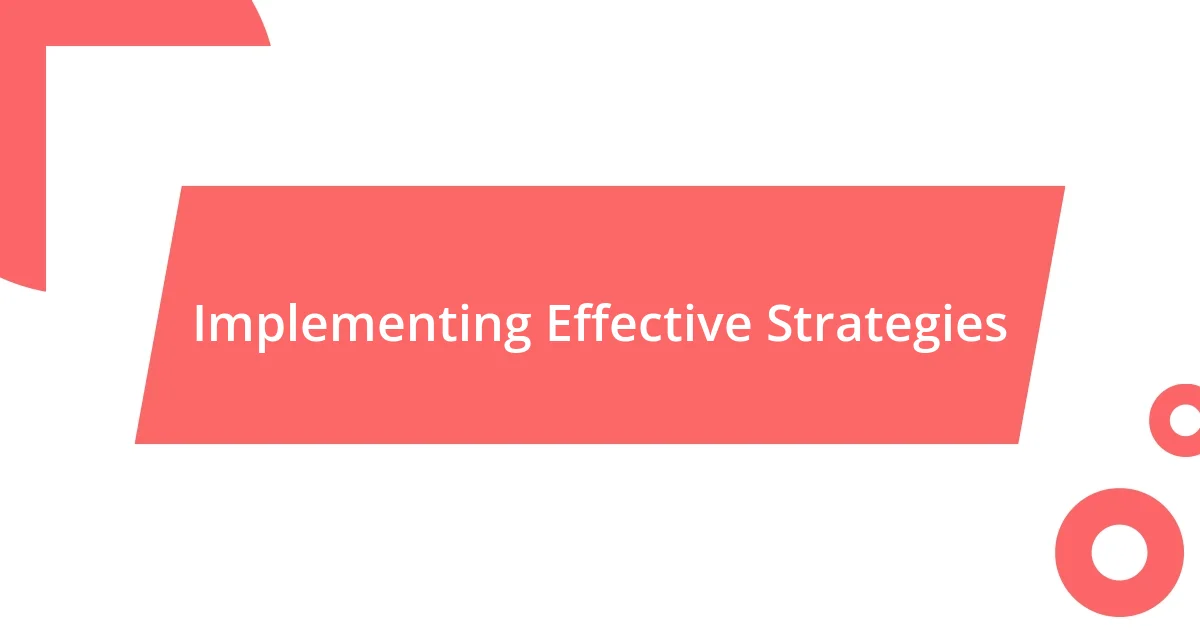
Implementing Effective Strategies
Once I started implementing effective strategies, the transformation in my gaming was remarkable. For instance, I embraced the idea of dedicated practice sessions instead of random play. I distinctly remember setting up a schedule where I’d focus solely on one aspect of the game for an hour, like improving my sniper accuracy. This entirely changed my approach; it became less about just playing and more about honing specific skills, which felt incredibly fulfilling.
Another strategy I found helpful was to join online forums and communities. Engaging with other players opened my eyes to fresh tactics and perspectives. I still recall a discussion where someone shared a unique positioning strategy for a popular map. I couldn’t wait to test it out in my next match! The thrill of discovering new strategies is both exciting and motivating. It reminded me that there’s always room for improvement.
Lastly, I made sure to reflect after each gaming session. I’d ask myself what went well and what didn’t. Did I stick to my strategies? Did I allow my emotions to sway my decisions? This reflective practice became a crucial part of my growth. It may feel tedious at times, but it’s those honest assessments that push you forward. Have you ever taken a moment to analyze your mindset during a game? I can tell you—it reveals so much and ultimately enhances your performance!
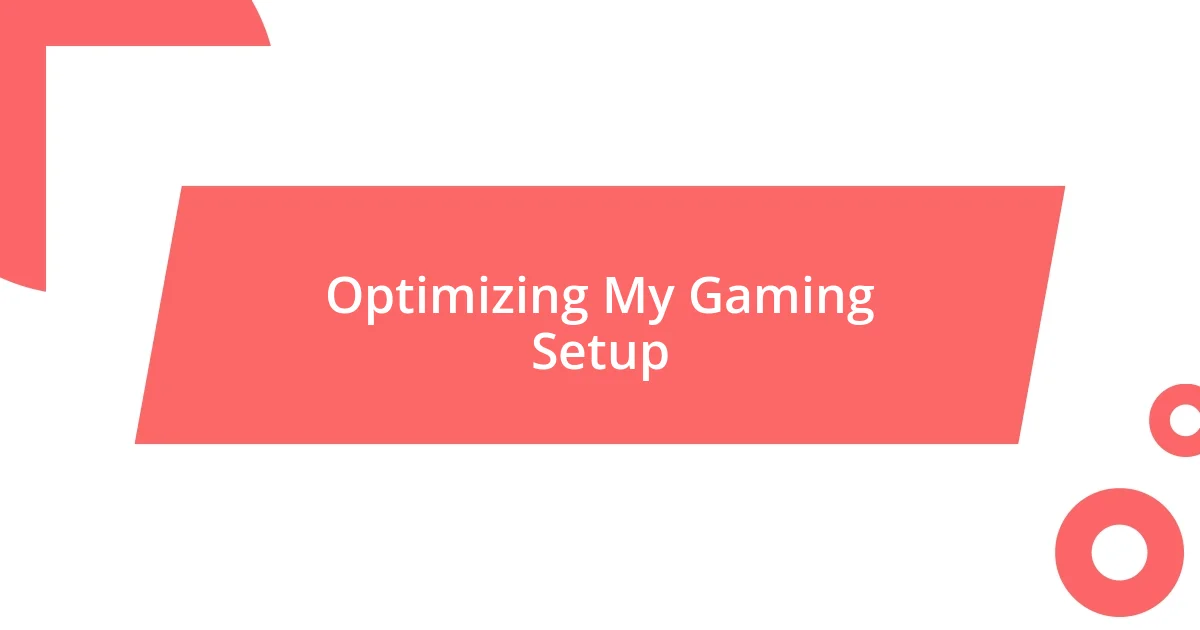
Optimizing My Gaming Setup
Optimizing my gaming setup was vital for boosting my performance. I made a simple yet impactful change by rearranging my desk to ensure everything was within easy reach. I remember how awkward it felt squinting at my monitor or fumbling for a headset. Once I organized my setup, I felt a surge of focus during my matches—there’s something about having a clean, streamlined space that lets you dive into the game without distractions.
Another adjustment was upgrading my equipment. Investing in a high-refresh-rate monitor changed the visuals and my responsiveness. Watching fast-paced action on a seamless display was exhilarating! It felt like I had an edge over my opponents. The smoother gameplay reduced frustration, allowing me to concentrate on strategy instead of grappling with lag or motion blur. Have you ever noticed how equipment can dramatically shift your gaming experience?
Lighting also played a significant role in my optimization process. I installed LED strips behind my monitor and adjusted the brightness levels to avoid eye strain during long sessions. There’s something surprisingly calming about the ambient glow—it creates an inviting atmosphere that keeps me engaged for hours. I often find myself absorbed in the game, free from discomfort. This simple addition made a world of difference, enhancing my overall enjoyment while keeping my focus sharp.
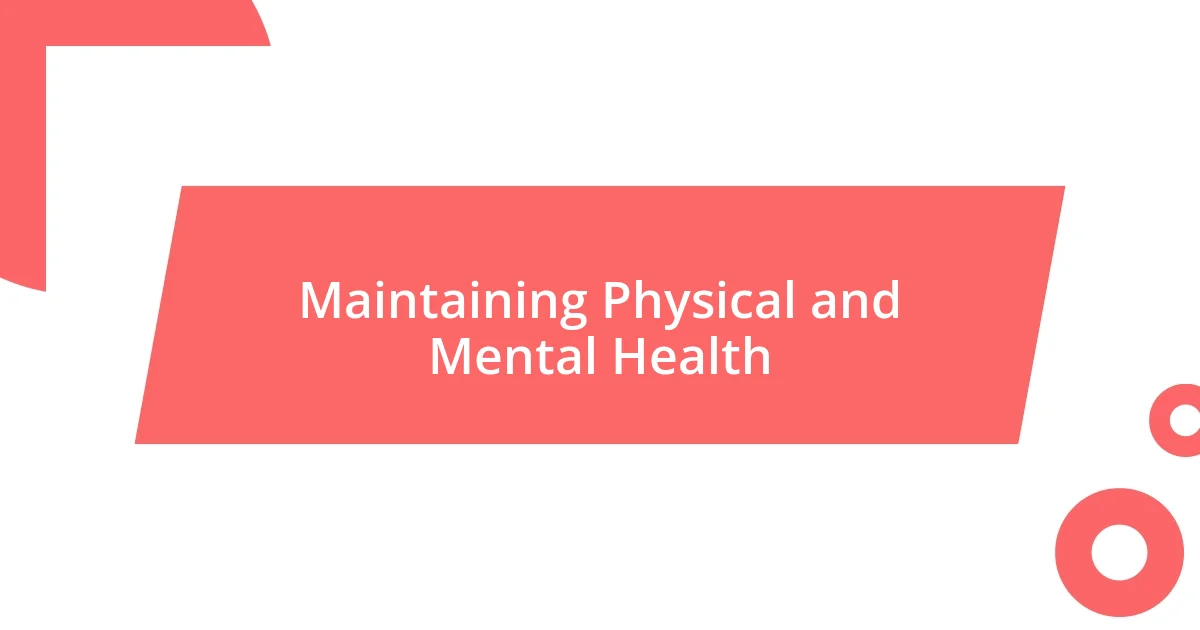
Maintaining Physical and Mental Health
Taking care of my physical health has been a game-changer for my gaming performance. I remember those early days when I’d binge on snacks and skip exercise, and the fatigue hit me hard during sessions. Once I committed to regular workouts and balanced my diet, my stamina improved dramatically. Have you ever noticed how a brisk walk can clear your mind and sharpen your focus? For me, integrating physical activity into my routine has drastically enhanced my reaction times and overall gameplay.
On the mental health front, I began prioritizing relaxation techniques like meditation and deep breathing. Initially, I thought, “How could sitting still possibly help my gaming?” But the calming effect it had on my mind was profound. After just a few sessions of mindfulness practices, I found myself more composed during high-stakes moments in games. It’s amazing how taking just ten minutes to disconnect can refresh your brain and reinvigorate your focus. Have you ever considered how your mental state impacts your gameplay? For me, those quiet moments paved the way for my best performances.
Sleep, too, became non-negotiable for me. I’ll admit, late-night gaming marathons were my guilty pleasure, but I quickly learned the consequences of sleep deprivation. The difference after a good night’s sleep was immediate; I felt sharper and more responsive. It’s as if the fog lifted, allowing me to think clearly and strategize effectively. Do you treat sleep as an essential part of your routine? Trust me, prioritizing rest has been one of the best decisions I’ve made for both my physical and mental gaming health.
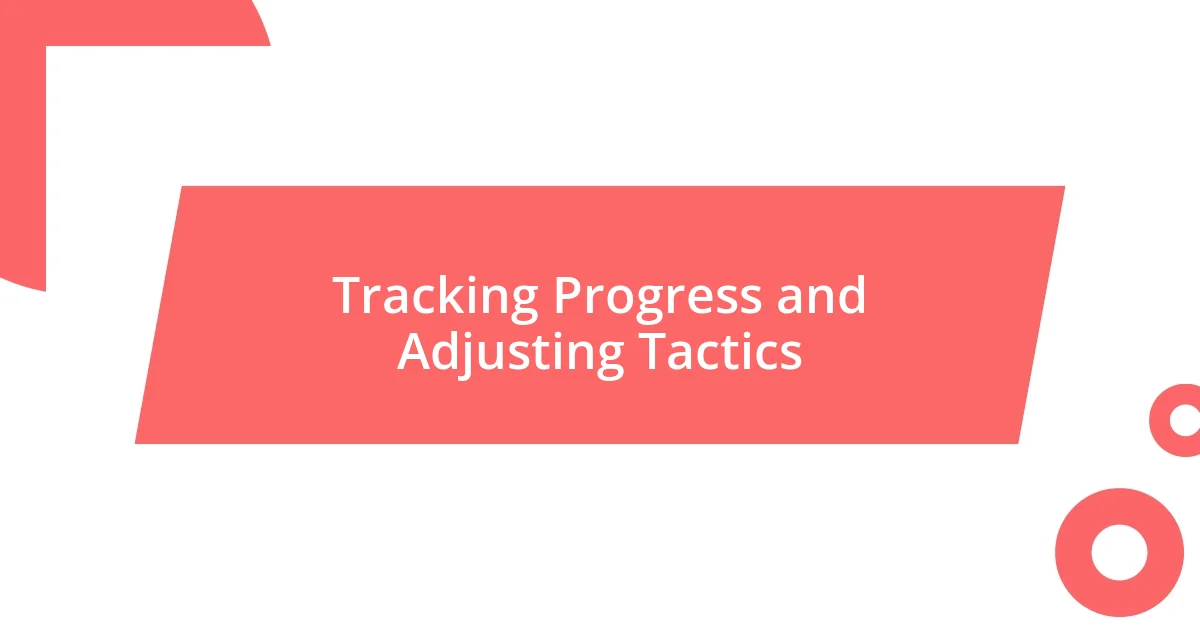
Tracking Progress and Adjusting Tactics
Tracking my progress has been a revelation in my gaming journey. I started by maintaining a simple spreadsheet where I logged my stats, wins, and losses after each session. Seeing everything laid out right in front of me brought clarity to my performance, and I could identify trends that I never would have noticed otherwise. Have you ever found that the numbers tell a story you didn’t expect? For me, that insight helped me understand which areas needed improvement.
Adjusting my tactics based on that data has been transformative. For example, after noticing that I struggled in long-range engagements more than I thought, I decided to dedicate specific practice sessions to perfecting my aim. I recall one afternoon where I spent hours just focusing on precision shooting in a training mode. The more I focused on those weaknesses, the more my confidence grew. It’s like refining a basic skill until it becomes second nature—have you experienced that “aha” moment when everything clicks into place?
Regularly reviewing my gameplay footage has also become a crucial part of my progress-tracking routine. At first, it felt awkward watching myself play, but over time, I realized it was a goldmine for learning. I could pinpoint my mistakes and celebrate the successes that I might have overlooked in the heat of the moment. Each review session was like holding up a mirror; I could really see where I needed to adjust my tactics and plan my next moves. Do you feel the same way when you analyze your own gameplay? That process has made such a difference for me in honing my skills and enhancing my overall strategy.










